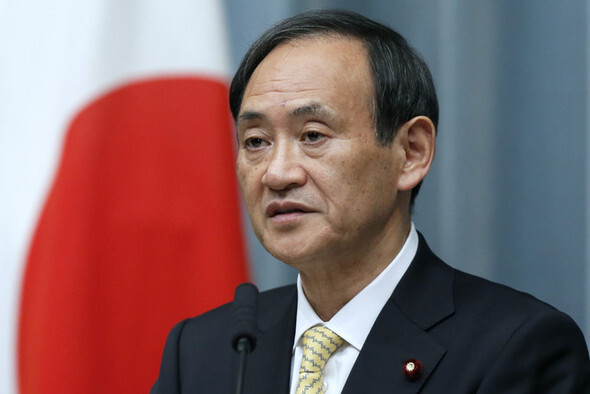hankyoreh
Links to other country sites 다른 나라 사이트 링크
Japan broadening its meaning of exercising collective self-defense

The Japanese government has clearly indicated that exercising its right to collective self-defense could include carrying out a preemptive strike on “enemy bases,” referring to North Korean missile bases. After Japan and the US revised their defense guidelines at the end of last month, the Japanese government seems to be gradually increasing the examples it offers of how it might exercise this right.
When asked during a press conference on May 25 whether Japan’s right to self-defense would enable it to attack an “enemy base,” Japanese Chief Cabinet Secretary and government spokesperson Yoshihide Suga said, “The use of force in the territory of another country is generally prohibited, but the Constitution does not prohibit such an attack if it falls under the three new conditions. Our previous policy of basing decisions on these three new conditions remains the same and also goes for attacks on enemy bases.”
When the Japanese cabinet decided to enable the exercise of the right to collect self-defense in July 2014, it created three new conditions under which Japan could exercise force. These three conditions are that a country in a close relationship with Japan must be attacked in a way that presents a clear threat to the survival of Japan, that there must be no other available options, and that the minimum necessary force must be used.
Suga’s remarks are being interpreted as confirming that the Japanese government could attack a North Korean missile base even if Japan has not itself been attacked if North Korea launches a missile at the US and if this presents a clear threat to the security of Japan.
“As you are aware, Japan does not currently have military assets designed to attack enemy bases. Nevertheless, the response of the Diet is that striking an enemy’s guided missile base legally falls within the scope of self-defense if it is determined that there is no other option,” Suga went on to say. This appears to suggest that Japan will work to acquire means of attacking North Korean missile bases.
Japan has indicated that it wants to gain the ability to attack enemy bases from the beginning of the discussion about revising the defense guidelines in Oct. 2013. However, the Japanese government never cited such an attack as an example of exercising the right to collective self-defense when it was explaining the concept to the public. The possibility was first mentioned by Japanese Defense Minister Gen. Nakatani during an appearance on Fuji Television on May 17.
By Gil Yun-hyung, Tokyo correspondent
Please direct questions or comments to [english@hani.co.kr]

Editorial・opinion
![[Column] Park Geun-hye déjà vu in Yoon Suk-yeol [Column] Park Geun-hye déjà vu in Yoon Suk-yeol](https://flexible.img.hani.co.kr/flexible/normal/500/300/imgdb/original/2024/0424/651713945113788.jpg) [Column] Park Geun-hye déjà vu in Yoon Suk-yeol
[Column] Park Geun-hye déjà vu in Yoon Suk-yeol![[Editorial] New weight of N. Korea’s nuclear threats makes dialogue all the more urgent [Editorial] New weight of N. Korea’s nuclear threats makes dialogue all the more urgent](https://flexible.img.hani.co.kr/flexible/normal/500/300/imgdb/original/2024/0424/7317139454662664.jpg) [Editorial] New weight of N. Korea’s nuclear threats makes dialogue all the more urgent
[Editorial] New weight of N. Korea’s nuclear threats makes dialogue all the more urgent- [Guest essay] The real reason Korea’s new right wants to dub Rhee a founding father
- [Column] ‘Choson’: Is it time we start referring to N. Korea in its own terms?
- [Editorial] Japan’s rewriting of history with Korea has gone too far
- [Column] The president’s questionable capacity for dialogue
- [Column] Are chaebol firms just pizza pies for families to divvy up as they please?
- [Column] Has Korea, too, crossed the Rubicon on China?
- [Correspondent’s column] In Japan’s alliance with US, echoes of its past alliances with UK
- [Editorial] Does Yoon think the Korean public is wrong?
Most viewed articles
- 1[Column] Park Geun-hye déjà vu in Yoon Suk-yeol
- 2Will NewJeans end up collateral damage in internal feud at K-pop juggernaut Hybe?
- 3N. Korean hackers breached 10 defense contractors in South for months, police say
- 4Why Korea shouldn’t welcome Japan’s newly beefed up defense cooperation with US
- 5[Guest essay] The real reason Korea’s new right wants to dub Rhee a founding father
- 6Thursday to mark start of resignations by senior doctors amid standoff with government
- 7[Editorial] New weight of N. Korea’s nuclear threats makes dialogue all the more urgent
- 8The dream K-drama boyfriend stealing hearts and screens in Japan
- 9Kim Jong-un expressed ‘satisfaction’ with nuclear counterstrike drill directed at South
- 10Terry Anderson, AP reporter who informed world of massacre in Gwangju, dies at 76